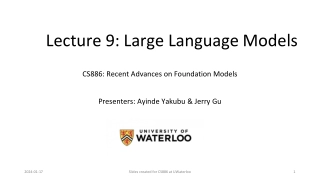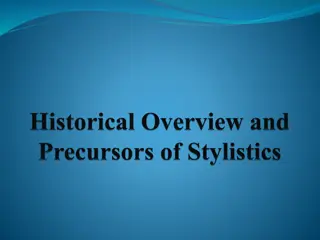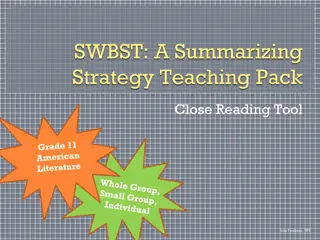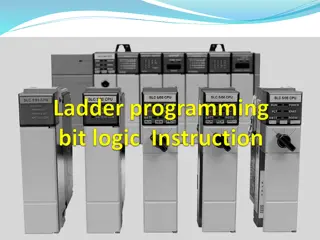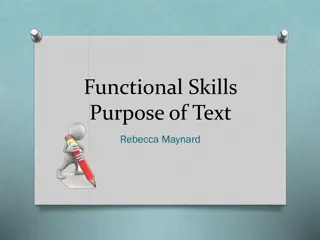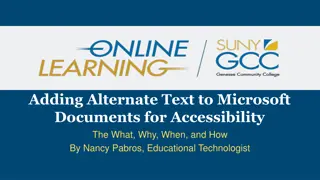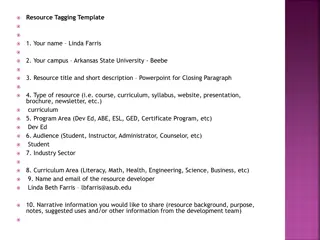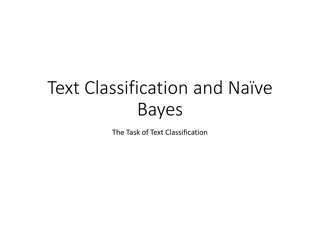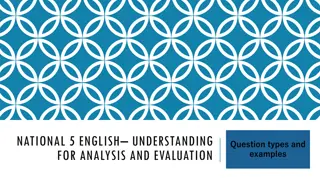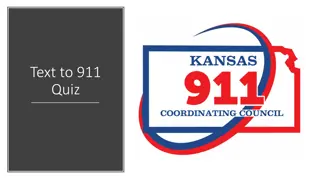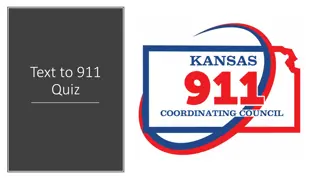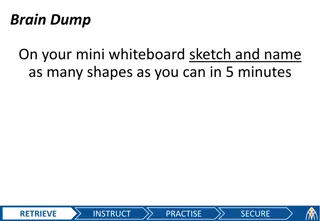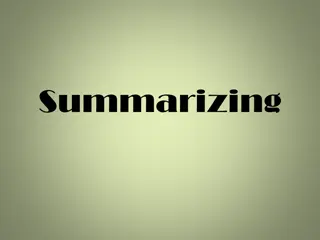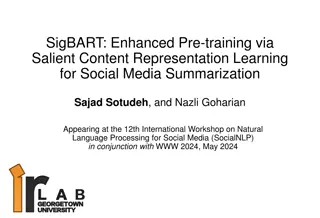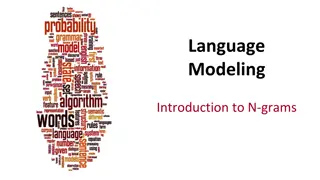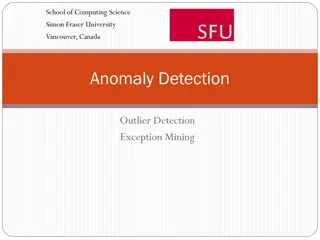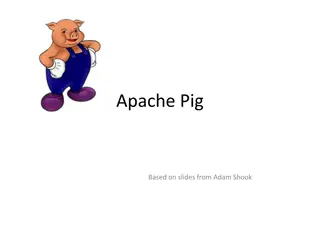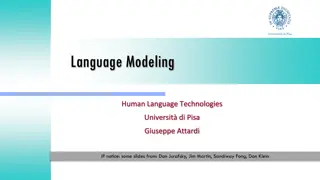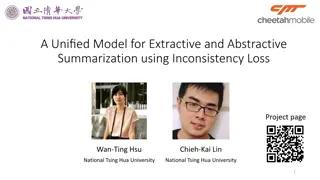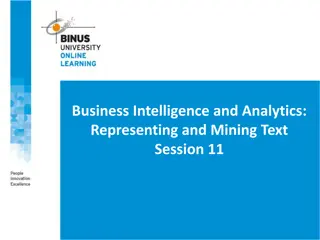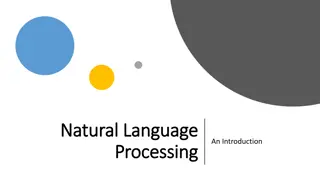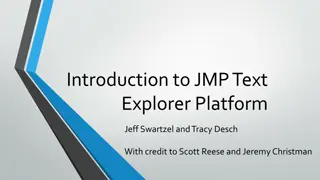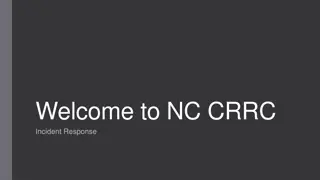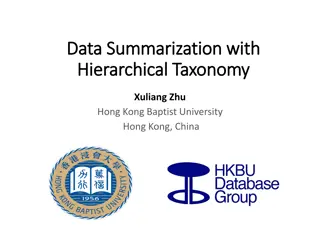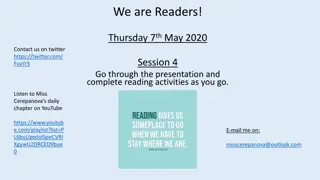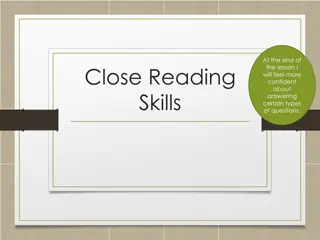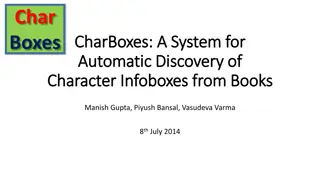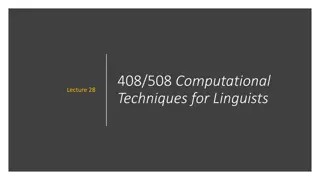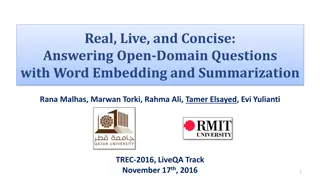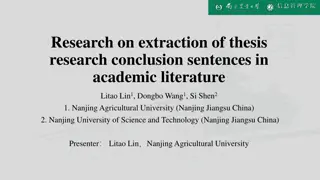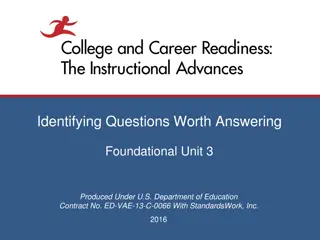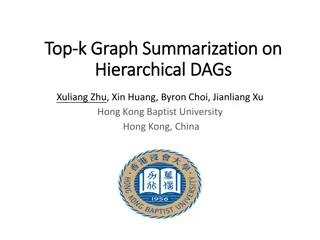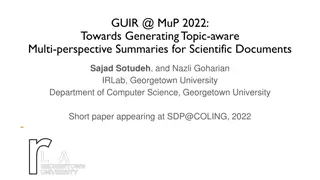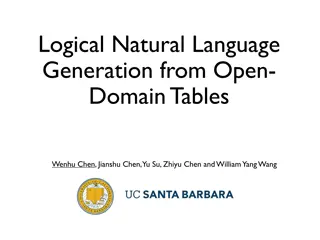Recent Advances in Large Language Models: A Comprehensive Overview
Large Language Models (LLMs) are sophisticated deep learning algorithms capable of understanding and generating human language. These models, trained on massive datasets, excel at various natural language processing tasks such as sentiment analysis, text classification, natural language inference, s
2 views • 83 slides
Enhance Reading Skills with KS2 Reading Vipers | Literacyshed 2017
KS2 Reading Vipers is a set of reading prompts designed to improve key reading skills among Key Stage 2 students. These prompts are based on the 2016 reading content domains from the National Curriculum Test Framework. The prompts cover various skills such as vocabulary, inference, prediction, expla
0 views • 11 slides
Assistant's Helpful Guide for Crafting Effective Content
Crafting effective content requires attention to detail and structure. This guide breaks down the essential elements of creating impactful content, giving you tips on content creation, summarization, and optimization. Learn to captivate readers, optimize for search engines, and engage your audience
0 views • 15 slides
SWBST Summarizing Strategy Teaching Pack Overview
SWBST is a summarizing strategy designed by Julie Faulkner to help readers comprehend texts effectively. It entails breaking down texts into key components: Somebody (main character/speaker/author) Wanted (motivation), But (problem/conflict), So (solution), Then (resolution). The strategy aids in hi
0 views • 18 slides
Introduction to Structured Text in PLC Programming
Structured text is a high-level text language used in PLC programming to implement complex procedures not easily expressed with graphical languages. It involves logical operations, ladder diagrams, and efficient control logic for industrial automation. Concepts such as sensor input, logic operation
5 views • 23 slides
Understanding Functional Skills: Text Analysis and Application
This instructional text guides learners through the purpose of functional skills in analyzing different types of text, such as skimming and scanning, and understanding the features of various text genres. It includes activities to practice skimming, scanning, and detailed reading, with a focus on de
0 views • 13 slides
Enhancing Accessibility Through Alternate Text in Microsoft Documents
Explore the importance of alternate text in Microsoft documents for accessibility. Learn what alternate text is, why and when you should use it, and how to add it effectively. Discover the benefits of incorporating alternate text and the legal aspects related to accessibility under Section 508. Enha
0 views • 23 slides
Exploring the Changes in Weather through English Lessons
Introduction to an English lesson for Class Nine students on the topic of the changes in weather. The lesson aims to improve vocabulary, comprehension skills, and summarization abilities. Images and activities such as identifying words related to weather and analyzing a text about Meherjan are inclu
1 views • 26 slides
Crafting Effective Closing Paragraphs in Essays
Explore techniques for writing compelling closing paragraphs in essays, emphasizing the importance of summarization, thought-provoking questions, and engaging the reader's curiosity. Learn how to structure your conclusion to leave a lasting impact on your audience.
0 views • 15 slides
Analyzing Story Structure and Point of View in A Package for Mrs. Jewls
In "A Package for Mrs. Jewls" by Louis Sachar, students explore the elements of humorous fiction through funny characters, dialogue, and unexpected plot resolutions. The story's structure, including setting, characters, conflict, and resolution, is analyzed using reading strategies like visualizatio
0 views • 24 slides
Text Classification and Nave Bayes: The Power of Categorizing Documents
Text classification, also known as text categorization, involves assigning predefined categories to free-text documents. It plays a crucial role in organizing and extracting insights from vast amounts of unstructured data present in enterprise environments. With the exponential growth of unstructure
0 views • 28 slides
Understanding Audience and Purpose in Text Analysis
When analyzing written texts, identifying the purpose and audience is crucial. The purpose reflects the reason behind the text, while the audience indicates who the text is intended for. By recognizing these aspects, one can better understand the content, language, and overall impact of the text. Va
1 views • 50 slides
Text Analytics and Machine Learning System Overview
The course covers a range of topics including clustering, text summarization, named entity recognition, sentiment analysis, and recommender systems. The system architecture involves Kibana logs, user recommendations, storage, preprocessing, and various modules for processing text data. The clusterin
0 views • 54 slides
Essential Information on Text-to-911 System
Explore key details about the text-to-911 system, including capturing text conversations, handling abandoned calls, transferring text calls to queues, and managing text conversations effectively. Learn about system configurations, call release timings, and dispatcher capabilities in handling text me
0 views • 12 slides
Text-to-911 System Operations Quiz
Test your knowledge on Text-to-911 system operations with this quiz. Learn about capturing text conversations, handling abandoned calls, transferring calls to queues, text conversation timelines, and more. Enhance your understanding of the protocols and procedures involved in managing text-based eme
1 views • 12 slides
Exploring 2D Shapes and Polygons
Uncover the world of 2D shapes and polygons with a brain dump session, identifying common shapes like triangles, quadrilaterals, and polygons with Greek and Latin numerical prefixes. Learn the distinguishing features of shapes, symbols used to represent key characteristics, and how markings denote e
0 views • 27 slides
Mastering Story Summarization with Graphic Organizers
Dive into the art of summarizing stories effectively using graphic organizers like the "Somebody, Wanted, But, So, Then, Finally" method. Learn to identify main characters, their desires, conflicts, resolutions, and more for concise and impactful summaries.
0 views • 19 slides
Enhanced Pre-training for Social Media Summarization
Enhanced LM pre-training using salient span representations aims to improve key information prioritization in social media summarization tasks. The method involves aligning user posts with TL;DR summaries, identifying salient spans, and utilizing text infilling for representation learning.
0 views • 13 slides
Introduction to N-grams and Language Modeling
Language modeling is essential for tasks like machine translation, spell correction, speech recognition, summarization, and question-answering. Dan Jurafsky explains the goal of assigning probabilities to sentences, computing the probability of word sequences, and applying the Chain Rule to compute
0 views • 78 slides
Advanced Techniques in Relational Data Outlier Detection
This document delves into cutting-edge methods for outlier detection in relational data, focusing on profile-based and model-based approaches such as leveraging Bayesian networks, feature generation, and individual feature vector summarization. The examples provided showcase the application of these
1 views • 30 slides
Introduction to Apache Pig: A High-level Overview
Apache Pig is a data flow language developed by Yahoo! and is a top-level Apache project that enables non-Java programmers to access and analyze data on a cluster. It interprets Pig Latin commands to generate MapReduce jobs, simplifying data summarization, reporting, and querying tasks. Pig operates
0 views • 57 slides
Understanding Language Modeling in Human Language Technologies
Exploring the concepts of language modeling in human language technologies, this presentation delves into N-grams, the chain rule of probability, evaluation metrics like perplexity, smoothing techniques such as Laplace, and the goal of assigning probabilities to sentences. It covers applications lik
1 views • 81 slides
Unified Model for Extractive and Abstractive Summarization
This project proposes a unified model that combines both extractive and abstractive summarization techniques using an inconsistency loss. The approach involves training procedures to enhance the summarization process and presents experimental results demonstrating its effectiveness. The study conclu
1 views • 49 slides
Efficient Assistant for your Needs
Providing assistance and information based on the content provided. Title creation, summarization, and tagging services available. Language detection also available. Let me know how I can help you better.
0 views • 11 slides
Enhancing Query-Focused Summarization with Contrastive Learning
The study explores incorporating contrastive learning into abstractive summarization systems to improve discernment between salient and non-salient content in summaries, aiming for higher relevance to the query. By designing a contrastive learning framework and utilizing segment scores, the system c
0 views • 16 slides
Understanding Text Representation and Mining in Business Intelligence and Analytics
Text representation and mining play a crucial role in Business Intelligence and Analytics. Dealing with text data, understanding why text is difficult, and the importance of text preprocessing are key aspects covered in this session. Learn about the goals of text representation, the concept of Bag o
0 views • 27 slides
Introduction to Natural Language Processing
Natural Language Processing (NLP) is a field that focuses on enabling computers to understand, interpret, and generate human language. It involves tasks such as machine translation, information extraction, text summarization, dialogue systems, tagging, and speech recognition. NLP presents challenges
0 views • 26 slides
Introduction to JMP Text Explorer Platform: Unveiling Text Exploration Tools
Discover the power of JMP tools for text exploration with examples of data curation steps, quantifying text comments, and modeling ratings data. Learn about data requirements, overall processing steps, key definitions, and the bag of words approach in text analysis using Amazon gourmet food review d
0 views • 23 slides
Network Monitoring Workshop - Incident Response Overview
This workshop covers various aspects of incident response, including tools and techniques such as network taps, protocol analysis with Wireshark, data summarization with Bro/Zeek, alerting with Snort/Suricata, and more. Sessions delve into topics like TLS inspection, wireless network monitoring, and
0 views • 17 slides
Data Summarization with Hierarchical Taxonomy: Motivations and Examples
The research discusses the use of Hierarchical DAGs in summarizing data with a focus on disease ontology and animal diseases. It explores how general concepts can summarize specific items and their relationships. The study also presents motivated examples of popular papers summarization in SIGMOD, s
0 views • 27 slides
Interactive Reading Activities and Resources for May 7, 2020
Engage in a variety of reading activities and resources including a presentation, listening to a daily chapter, vocabulary exercises, and in-depth text analysis. Explore intriguing reads on a recommended website and enhance your predictive skills. Dive into a captivating excerpt from "Street Child"
0 views • 7 slides
Enhancing Close Reading Skills for Better Comprehension
Improve your ability to understand and interpret written passages by developing close reading skills. Gain confidence in answering questions related to passage comprehension, summarization, and word meanings. Practice locating key information, translating passages, and providing concise responses th
0 views • 52 slides
Automatic Discovery of Character Infoboxes from Books - CharBoxes System
The CharBoxes system aims to automatically discover character infoboxes from books, assisting in effective summarization, marketing, and understanding of book characters. By extracting important character details, constructing social graphs, summarizing character-centric text, and more, CharBoxes en
0 views • 20 slides
Understanding Bigrams and Generating Random Text with NLTK
Today's lecture in the Computational Techniques for Linguists course covered the concept of bigrams using NLTK. Bigrams are pairs of words found in text, which are essential for tasks like random text generation. The lecture demonstrated how to work with bigrams, including examples from the NLTK boo
0 views • 19 slides
Real-time Question Answering Using Word Embedding and Summarization Techniques
This research project aims to improve question answering over social media platforms by leveraging word embedding and summarization methods. The approach involves retrieving a large set of candidate answers from various sources, learning to rank these answers, and summarizing the top-ranked ones. Te
0 views • 22 slides
Automatic Extraction Model of Thesis Research Conclusion Sentences
Full-text academic literature contains rich data that can be analyzed using machine learning techniques. This research focuses on extracting thesis research conclusion sentences automatically to enhance summarization processes. The study involves data processing, annotation, and creating discriminan
0 views • 9 slides
Enhancing Reading Comprehension Through Text-Dependent Questions
This resource delves into the significance of text-dependent questions in improving students' reading comprehension skills by emphasizing the importance of evidence from the text, building knowledge through nonfiction, and developing critical thinking abilities. It highlights key advances in educati
0 views • 16 slides
Graph Summarization on Hierarchical DAGs
Explore top-k graph summarization techniques on Hierarchical Directed Acyclic Graphs (DAGs) like Disease Ontology, ImageNet, and Wikipedia Categories. Understand motivations for summarization, related works, and the kDAG-Problem. Discover algorithms, experiments, and conclusions for efficient graph
0 views • 38 slides
Advancing Multi-Perspective Summarization for Scientific Documents
In a short paper for SDP@COLING 2022, Sajad Sotudeh and Nazli Goharian from Georgetown University introduce a method for generating topic-aware multi-perspective summaries for scientific documents. They propose utilizing Neural Topic Modeling (NTM) to incorporate various perspectives from the papers
0 views • 11 slides
Advancements in Logical Natural Language Generation from Open-Domain Tables
Cutting-edge research in logical natural language generation (NLG) is transforming the field by moving beyond traditional surface realization to generate summarized text, conclude trends, and apply logical and mathematical operations. By addressing limitations such as lack of logical inference, summ
0 views • 33 slides
